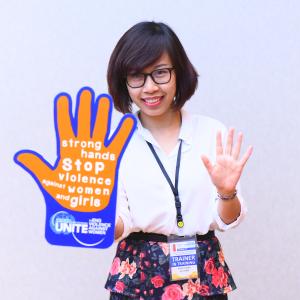Ethnic minority women seizing their potential and being counted in Viet Nam’s socioeconomic development
19 October 2018
- Hanoi, 19 October 2018 – Today, the dialogue "Seizing our Potential: Good Practices on Gender Mainstreaming in Socio-Economic Development Programmes in Ethnic Minority Communities" between civil society organisations, community based organisations and other stakeholders was organized by iSEE and UN Women, with financial support from Irish Aid, in the Candle Hotel, Hanoi.The dialogue was organized to create a space to share and document challenges and successes inensuring ethnic minority women are engaged at every stage of the development and implementation of socioeconomic development programmes in ethnic minority regions of Viet Nam.
Over 100 people attended the event coming from civil society organizations working on gender issues in ethnic minority areas, UN agencies, academia and staff from the Committee for Ethnic Minority Affairs. The diverse range of participants contributed to lively and engaging discussions, which stemmed from the sharing from ethnic minority women on how they have become active agents of change in their own communities.
Viet Nam is an ethnically diverse country, with 54 recognized ethnic groups, and 53 of these groups identified as ethnic minority. Each ethnic group has its own rich and vibrant traditions and cultural practices. However, due to the numerous cultural, social and geographic barriers they face, ethnic minorities often find themselves at the margins of Vietnamese society. Furthermore, research has shown that across ethnic minority groups, it is women and girls who have the most limited access to opportunities, resources and representation. Women and girls often find themselves discriminated against on the basis of both gender and ethnicity, which leaves them most at risk of social exclusion and marginalization, and vulnerable to poverty.
The Government of Viet Nam has enacted many policies and programmes aimed at reducing poverty rates in ethnic minority regions. Unfortunately, ethnic minorities, and ethnic minority women in particular, are often seen as passive beneficiaries rather than active agents of change throughout the development of these programmes. Additionally, many policies and programmes do not take the specific needs and wants of ethnic minority women and girls into account.
The focus of today's dialogue was on the ways by which civil society can unite to ensure that socioeconomic programmes in Viet Nam,including the P135 poverty reduction progamme, become more gender-responsive. The good practices shared with the audience today presentedhow ethnic minority women are central drivers of change in their families and communities. The dialogue highlighted the importance of civil society organizations in bridging the gap between progressive policies and implementation. Additionally, the interactive format of the event engaged participants in productive discussions on the best ways to harness the power and knowledge of ethnic minority women in communities.
Ms. Sam Thi Xinh, a member of co-research team in Bac Kan province shared: "I am very happy because I learn about my community's issues myself; it's not coming from outsiders. I have an opportunity to speak out based on the real evidence."
UN Women representative Ms. Thuy Thi Nguyen said in her opening remarks: "Today offers us a platform to unite in the shared goal of creating more space for ethnic minority women to have their voices heard and hold authorities accountable for commitments made to substantive gender equality. Today, we want you to engage in discussion and dialogue, and really explore the ways in which by working together and learning from each other, we can ensure that the needs and wants of women and girls in ethnic minority communities are mainstreamed and of central importance in all socioeconomic development programmes in ethnic minority communities."
"We strongly believe internal capacities of ethnic minorities women. Our roles as civil soceity organization, are to stand by their sides, give them the trust and provide them with opportunities to exercise their agency and power. And we will continue doing so." – Ms. Luong Minh Ngoc, Director of iSEE said.
Ultimately the dialogue today raised awareness about the challenges and success stories experienced when aiming to ensure gender is mainstreamed in socioeconomic development programmes. Based on today, participants said they look forward to seeing more ethnic minority women seizing their potential and making themselves counted in Viet Nam's development.
Contact detail:
- UN Women: Doan Thanh Ha – Communications Consultant | doan.ha@unwomen.org | Mob: 0985080631
- iSee: Ms. Tran An Binh – Communication Officer | tabinh@isee.org.vn | Mob: 090 662 8884


